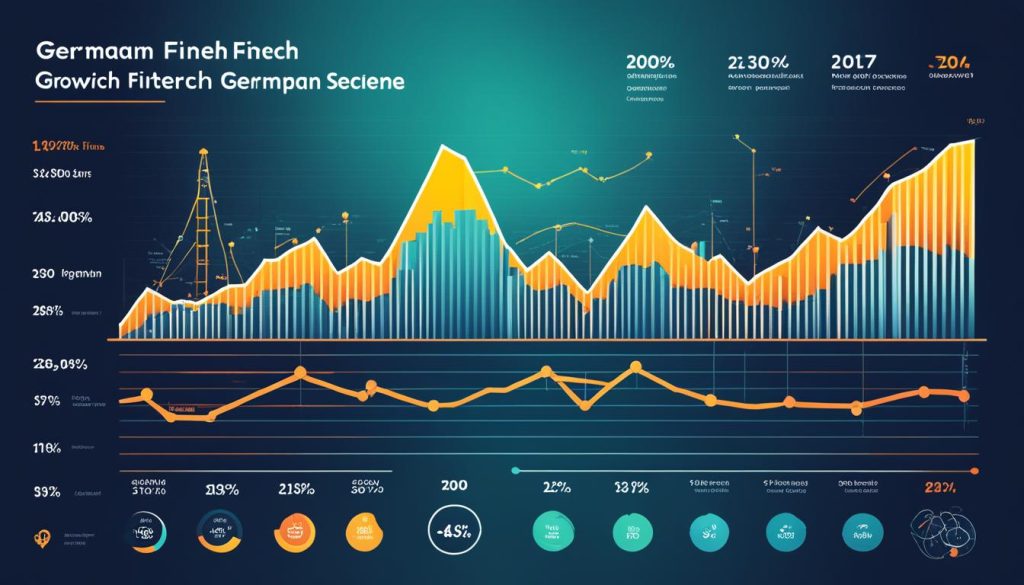Welcome to our exploration of the German fintech scene and its impressive growth. This is one of the liveliest parts of the German economy. Fintech is changing how financial services are offered and used.
Fintech uses new tech to make financial services better, safer, and easier to use. This includes everything from paying by phone to borrowing online. Fintech firms are transforming finance by using digital progress.
In Germany, fintech has grown a lot thanks to good regulations, great talent, and an enterprising spirit. The country’s solid financial network, including old banks, helps innovation and working together with fintech startups.
This article will look at the German fintech sector and how it’s growing. We’ll see what’s driving this growth, how startups and old banks are working together, and what’s new in payments and more.
We’ll also look at the rules for fintech in Germany and how they help innovation while keeping consumers safe. We’ll discuss the skills needed in the German fintech world and how German fintech firms are reaching out internationally.
Finally, we’ll talk about what the future may hold for German fintech. Understanding the sector well helps us make smart choices and use the opportunities it offers.
Key Takeaways:
- The German fintech scene has grown a lot recently.
- Fintech means using new tech to improve financial services.
- Growth is driven by supportive rules and partnerships between new startups and old financial institutions.
- New ideas are changing payments, banking, wealth management, and insurance.
- Germany’s fintech rules protect consumers while encouraging new ideas.
What is Fintech?
Fintech, or financial technology, is about using new tech to deliver financial services. It covers a lot of digital solutions aimed at changing traditional banking and finance.
Fintech has become more popular lately, changing the finance world and how we handle money. By using new tech like artificial intelligence, blockchain, and big data, fintech firms can offer better and more personal financial services to both consumers and businesses.
The Scope of Fintech
Fintech includes a wide variety of financial services, such as:
- Payment and remittance solutions
- Online lending platforms
- Personal finance and budgeting apps
- Robo-advisory investment platforms
- Blockchain-based cryptocurrencies and digital assets
- Insurtech and insurance innovation
- Regtech for regulatory compliance
- Crowdfunding and peer-to-peer lending platforms
This shows just how varied fintech solutions can be, revolutionizing the financial world.
Benefits of Fintech
Fintech brings many advantages to people, businesses, and the economy. Here are some benefits:
- Greater convenience: Fintech lets you access financial services online, avoiding trips to banks.
- Improved access to financial services: It makes financial services available to more people, like those without banks.
- Enhanced efficiency and cost savings: With digital processes, fintech firms can cut costs, offering better prices to customers.
- Increased financial inclusion: Fintech helps more people and businesses get the financial services they need.
The impact of fintech is expected to grow, with new advancements continually shaping finance’s future.
Overview of the German Fintech Scene
In recent years, Germany’s fintech sector has seen remarkable growth. It stands out as a top fintech hub in Europe. Thanks to its solid economy, friendly laws, and booming startup community, Germany attracts entrepreneurs and investors alike.
Important fintech firms like N26, Solarisbank, and Raisin are gaining fame worldwide. Their innovative work and unique business ideas have helped grow Germany’s fintech scene. They’ve also boosted its global standing, setting the stage for more progress.
The sector covers many fields, including payments, banking, and insurance. Both new and established companies use the latest tech to offer new financial products and services. They aim to meet the needs of consumers and businesses.
Open banking and API partnerships are trending in Germany’s fintech sector. Fintech startups are joining with traditional banks to offer customers better and more personal financial services. This teamwork encourages more innovation. It also creates new ways to make money and lifts customer happiness.
To give you a clear picture of Germany’s fintech world, here’s a table of some leading areas and firms in the industry.
| Category | Key Companies |
|---|---|
| Payments | N26, Wirecard, SumUp |
| Banking | Solarisbank, Tomorrow, CrossLend |
| Wealth Management | Scalable Capital, Raisin, Ginmon |
| Insurance | WeFox, Clark, Getsafe |
| Regulatory Technology | Clark, candis, Billie |
These names are just a part of the dynamic German fintech scene. Many other startups and big players are also making their mark, helping the industry grow.
Factors Driving Growth in the German Fintech Scene

The German fintech industry has grown because of key factors. These factors have made it a great place for creativity and growth. They include:
- Government Support: The German government helps fintechs grow. It has set up fintech hubs and funding programs. There are also regulatory sandboxes for new ideas and teamwork.
- Investor Interest: Local and international investors are keen on German fintechs. Startups get the money they need to expand from venture capital and angel funding. Big successes like N26 and Solarisbank have pulled in global investments.
- Regulatory Changes: New laws have helped the fintech industry in Germany. Changes like the PSD2 and the Money Laundering Act have made it easier for new companies to start. They also bring more competition and new ideas in payments.
- Strong Banking Sector: Germany has strong banks. This helps fintech startups by giving them access to customers and expertise. Working with traditional banks has brought new tech into finance.
These factors, plus skilled workers and a population that loves tech, have sped up growth. Now, Germany is a top spot for fintech in Europe.
Next, we’ll look at how fintech startups and banks work together. We will discuss the good and the hard parts of these partnerships.
| Factors | Impact |
|---|---|
| Government Support | Proactive policies and initiatives |
| Investor Interest | Significant funding and financial resources |
| Regulatory Changes | Facilitation of innovation and competition |
| Strong Banking Sector | Collaborations and access to customer bases |
Collaboration between Fintech Startups and Traditional Financial Institutions
In recent years, fintech startups and traditional financial institutions in Germany have begun to work together more. This partnership combines the creativity of fintech startups with the experience of established financial institutions. Together, they’re making Germany’s fintech scene grow.
This teamwork brings together the best of both worlds. Fintech startups bring innovative solutions and new ideas. Meanwhile, traditional financial institutions offer a big customer base and knowledge of the rules.
The benefits of this partnership are many. Fintech startups get to grow faster with the help of traditional institutions’ resources. These institutions, in turn, become more modern with the startups’ fresh ideas. This helps them stay ahead in the ever-changing market.
However, working together isn’t always easy. The different cultures and ways of working can sometimes cause problems. Startups are quick and flexible but might struggle with the strict rules of traditional institutions. Traditional institutions might find it hard to incorporate the startups’ new ideas into their old systems.
To make collaboration work, both sides must communicate well and trust each other. It’s important for them to learn from each other and adjust their plans to fit together better.
Image: Collaboration between Fintech Startups and Traditional Financial Institutions
The partnership between fintech startups and traditional financial institutions in Germany is key for the fintech scene’s innovation and growth. It’s shaping the future of finance by introducing new technologies and better services for customers.
Innovation in Payments and Banking Services
In the fast-moving world of fintech, innovation in payments and banking has been key in Germany’s fintech success. We’ve seen great strides in mobile payments, digital banking, and blockchain. These have changed traditional banking ways and improved how customers experience services.
One major breakthrough has been mobile payment solutions. Companies like PayPal, Apple Pay, and Google Pay have turned smartphones into digital wallets. This allows for easy and safe payments with just a tap. Now, paying without cash has become the norm, thanks to these handy methods.
Digital banking has also advanced a lot, with N26 and Revolut at the front. These digital banks let people handle their banking from their phones, without physical branches. They offer real-time alerts, budget tools, and simple money transfers, putting users in charge of their finances.
Blockchain technology is changing the banking industry, making transactions secure and open. Ripple and Bitwala use blockchain for quicker international payments without middlemen. Blockchain’s secure, decentralized system means less fraud risk, making it a trustworthy alternative to old bank systems.
Here’s a comparison to show how innovation is changing banking:
| Traditional Banking | Fintech Innovation |
|---|---|
| Long wait times for international transfers | Real-time cross-border payments using blockchain |
| Physical branches and limited banking hours | 24/7 access to digital banking services |
| High transaction fees | Low-cost or no-cost transfers |
| Limited transparency in transactions | Transparent and traceable blockchain transactions |
The fintech industry’s growth promises more breakthroughs in payments and banking. These innovations offer users more convenience, security, and lower costs. They also challenge traditional banks to adapt and compete in this digital era.
Wealth Management and Robo-Advisors

In recent years, Germany’s fintech scene has undergone major changes, especially in wealth management. Traditional ways of managing wealth are now competing with new, tech-savvy platforms called robo-advisors. These platforms use artificial intelligence and algorithms for automated investment advice and managing portfolios.
Robo-advisors have made wealth management available to more people. Now, investors can get professional advice and manage their portfolios without high fees or large minimums. This has attracted investors looking for efficient, cost-friendly options to increase their wealth.
Robo-advisors are easy to use, making the investment process straightforward. Investors can start accounts, set goals, and track their investments anytime. They adjust investment strategies to match each investor’s risk level, time frame, and financial goals, offering customised solutions.
These platforms are great at building diversified investment portfolios. They follow Modern Portfolio Theory, stressing diversification across different asset classes to lower risk and improve returns. Investments spread across assets like stocks, bonds, and commodities help investors create balanced portfolios that meet their goals and risk comfort.
| Advantages of Robo-Advisors for Wealth Management | Advantages of Traditional Wealth Management |
|---|---|
|
|
Robo-advisors have shaken up the traditional wealth management industry in Germany. To stay relevant, many traditional firms have started their own robo-advisor services. This leads to more choices and innovation for investors.
As fintech grows, robo-advisors will become more important in wealth management. Artificial intelligence and advanced algorithms will provide more complex strategies and personalised services. This means a future where managing wealth is more efficient, accessible, and customised for everyone’s needs.
Insurtech and Insurance Innovation
Insurtech combines insurance and technology. It’s changing the insurance world in big ways. In Germany, insurtech startups are creating new solutions that are quite exciting.
These companies use artificial intelligence, big data, and machine learning. They’re changing how insurance works. They offer personalized insurance services, making customers happier.
Take Lemonade as an example. It’s a standout insurtech firm in Germany. Lemonade uses a chatbot to offer easy and fast insurance help. It’s a hit with people who like using technology for convenience and clear information.
The insurtech movement is reshaping not just personal insurance but business insurance too. Startups like Wefox make buying insurance smoother. They connect brokers, customers, and underwriters digitally. This brings better service, more transparency, and improved risk management.
Benefits of Insurtech
Insurtech is making the insurance sector better in several ways:
- It’s making customers’ experiences better with easy-to-use online platforms, simple insurance applications, and customized offers.
- Companies are becoming more efficient and saving on costs. They’re doing this by automating their processes, using data more smartly, and cutting down on paperwork. This means they can offer better prices and quicker service.
- By using the latest in analytics and machine learning, insurtech firms can judge risks better. This leads to smarter decisions and prevents problems before they happen.
- Insurtech is reaching new customers through online channels. This is helping more people get insurance, which is good for everyone.
The Future of Insurtech in Germany
The insurtech sector in Germany is set to grow and bring more innovations. With supportive laws, talented people, and increasing acceptance of digital services, insurtech startups are likely to keep shaking up the traditional insurance ways.
| Insurtech Startup | Innovation |
|---|---|
| Lemonade | Chatbot interface for hassle-free insurance solutions |
| Wefox | Digital platform connecting insurance brokers, customers, and underwriters |
| Clark | AI-powered platform for personalized insurance recommendations |
Regulatory Landscape for Fintech in Germany
In this section, we’re diving into how fintech is regulated in Germany. It’s important to know how fintech firms are governed. This helps keep things fair and safe for everyone. Germany is a top spot for fintech in Europe because it has strong rules for innovation and safety.
Regulatory Environment in Germany
The Federal Financial Supervisory Authority (BaFin) and the German Central Bank (Bundesbank) set the rules for fintech in Germany. They make sure fintech firms can grow but also keep investors and customers safe.
Promoting Innovation
Germany encourages fintech innovation with cool regulations. The government’s “Fintech Action Plan” makes it easier for startups. It allows them to experiment and grow in their early days. This way, fintech firms can come up with new and exciting offerings.
Consumer Protection
Looking after consumers is at the heart of Germany’s fintech rules. They focus on being open, protecting data, and having fair play. With the EU’s General Data Protection Regulation (GDPR), fintech firms must handle personal data safely.
Challenges and Compliance
Even though the rules support innovation, sticking to them can be tough for fintech firms. It can be especially hard for new companies with not much money. But, these rules are key for keeping the financial world safe and trustworthy.
| Regulatory Landscape | Fintech Companies | Key Areas |
|---|---|---|
| Financial Conduct Authority (FCA) | Revolut | Consumer Protection |
| Bundesbank | N26 | Financial Stability |
| BaFin | SolarisBank | Licensing and Supervision |
Different regulators look at various parts of Germany’s fintech scene, as the table shows. Fintech firms need to get the right licenses and follow the rules to work legally.
The picture above shows how Germany’s fintech rules work. It connects all the important regulators and their role in the fintech world.
To wrap up, Germany’s fintech rules balance innovation with protecting consumers. Fintech firms must understand and follow these rules to succeed. The government keeps updating these rules to match new tech and business methods.
Talent and Skills in the German Fintech Scene

Germany’s amazing growth in fintech comes from its rich talent pool. Thanks to its focus on education and innovation, Germany attracts the finest in the fintech world.
Educational Opportunities
German universities are of paramount importance for fostering fintech talents. Institutions like the Technical University of Munich and the Frankfurt School of Finance and Management offer targeted programs. They give students skills in finance, technology, and data analytics.
Vocational training in Germany is also top-notch, blending theory with practical learning. These programs prepare learners for real fintech challenges, boosting their job prospects.
Collaboration with Industry
There’s strong partnership between German fintech firms and academic bodies. Through internships and mentorships, students get a peek into the fintech world. They learn valuable practical skills in the process.
Attracting International Talent
Germany’s fintech sector is also a magnet for international experts. This influx of global talents brings in fresh ideas, driving innovation. It makes the industry grow faster.
These companies don’t just look locally; they hire from everywhere. This creates a diverse and innovative workforce, key for success.
The Role of Skills in Fintech
Today’s fintech world requires specific skills. German companies look for technical know-how like programming and cybersecurity. But they also value soft skills, like the ability to think critically and communicate effectively. These skills help professionals tackle the industry’s complexities.
As fintech grows, so does the need for skilled individuals. Prioritizing skill development helps the industry flourish. It ensures a future where everyone can succeed.
International Integration and Expansion of German Fintech Companies
In our global society, it’s vital for German fintech firms to branch out internationally. This move helps them secure a spot on the world stage of financial technology. They aim to grow and reach new customers by stepping outside of Germany.
Navigating the international market brings its challenges, like understanding different rules, cultures, and staying ahead of local competitors. Yet, the chance to boost income and connect with more talent makes the effort worthwhile.
German fintechs often partner with big financial players abroad. This approach gives them a quick and respected entry into new markets.
They also innovate to solve unique challenges in various regions. For instance, targeting places without solid banking systems. Here, their tech can make a huge difference, offering new financial services.
Besides, buying up fintech startups in other countries is another strategy they use. This move gives them instant market insight, customers, and understanding of local regulations.
This global mingling of German fintechs also sparks idea sharing and collaboration. It enriches the fintech sector worldwide by introducing fresh, innovative practices.
| Benefits of International Integration and Expansion | Challenges of International Expansion |
|---|---|
|
|
Ultimately, going international is crucial for German fintech companies seeking growth. By using their tech know-how, forming smart partnerships, and making sharper acquisitions, they can face challenges head-on. This strategy is how they can thrive globally.
Future Outlook for the German Fintech Scene
The German fintech scene looks set for a bright future. It’s growing fast and attracting a lot of investment. With new tech and easier rules, it’s expected to grow and innovate a lot in the coming years.
Key Trends and Opportunities
The industry aims to move into new areas beyond just payments and banking. There’s room to change and grow in fields like insurtech and wealth management. Technologies such as AI and Blockchain will likely make things more efficient and improve how customers feel about services.
Working together is key for fintech startups and old-school financial players. Big banks and institutions now see the benefit in partnering with fintech firms. This helps them innovate and keep up with what customers want.
Regulatory Developments
Rules and regulations will play a big part in shaping fintech’s future in Germany. The government is already helping fintech firms grow and get investments. Making rules simpler and the same across Europe will help the ecosystem and welcome new companies.
Emerging Technologies
New technologies will have a huge impact on German fintech. Things like mobile banking, touch-free payments, and digital wallets are already popular. Also, using biometrics and data to check identities and offer tailored services is something to keep an eye on.
| Key Factors for Future Growth | Opportunities | Challenges |
|---|---|---|
| Digitalization of financial services | – Expansion into new verticals – Collaboration with traditional financial institutions |
– Regulatory compliance – Cybersecurity concerns |
| Advancements in technology | – Integration of AI and Blockchain – Enhanced customer experience |
– Talent acquisition and retention – Rapid technological advancements |
| Supportive regulatory environment | – Streamlined licensing processes – Harmonization of regulations |
– Adapting to changing regulations – Ensuring consumer protection |
The future looks really good for the German fintech scene. It’s all about getting into new areas, working with big financial names, and using the newest tech. With more support from rules and changing customer needs, German fintech is set to be a leader in the finance world.
Conclusion
In conclusion, the German fintech scene has grown a lot. It’s now an important part of the world’s fintech industry. A mix of good regulations, teamwork, and skilled people has made fintech startups in Germany successful.
We’ve looked at what makes the German fintech scene tick. We talked about growth drivers, how fintech startups and banks work together, and new things in payments and banking. We also covered wealth management and insurance.
The future looks promising for German fintech. With more tech advances and a growing need for digital finance, more innovations are coming. Remember to keep up with the latest news and trends in the fintech world.
















